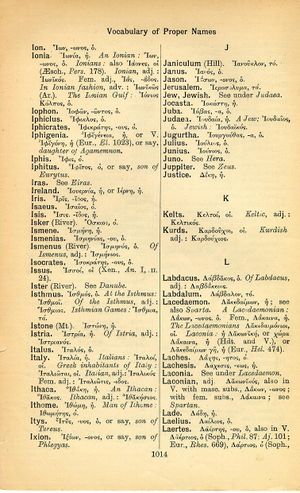Iphis: Difference between revisions
From LSJ
Sunt verba voces quibus hunc lenire dolorem possis, magnam morbi deponere partem → Words will avail the wretched mind to ease and much abate the dismal black disease.
m (Text replacement - "}}]]" to "}}]]") |
m (Text replacement - "link={{" to "link={{") |
||
| Line 1: | Line 1: | ||
{{WoodhouseENELnames | {{WoodhouseENELnames | ||
|Text=[[File:woodhouse_1014.jpg|thumb | |Text=[[File:woodhouse_1014.jpg|thumb | ||
|link= | |link={{filepath:woodhouse_1014.jpg}}]]Ἶφις, ὁ. | ||
}} | }} | ||
{{Lewis | {{Lewis | ||
Revision as of 10:10, 15 August 2017
English > Greek (Woodhouse)
Ἶφις, ὁ.
Latin > English (Lewis & Short)
Īphis: ĭdis, f.,
I a Cretan girl who was changed into a man, Ov. M. 9, 667.
Īphis: is, m., = Ἶφις.
I A youth of Cyprus, who hung himself because his love for Anaxarete was not returned, Ov. M. 14, 699.—
II One of the Argonauts, Val. Fl. 1, 441.
Latin > French (Gaffiot 2016)
(1) Īphis, ĭdis, f. (Ἶφις), fille de Lygdus, élevée sous des vêtements d’homme : Ov. M. 9, 667.
(2) Īphis, is, m. (Ἶφις), amant dédaigné d’Anaxarète, se pendit de désespoir : Ov. M. 14, 699 || un des Argonautes : Val. Flacc. 1, 441.

